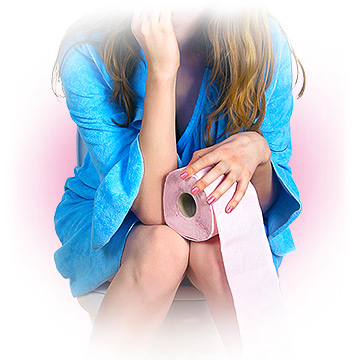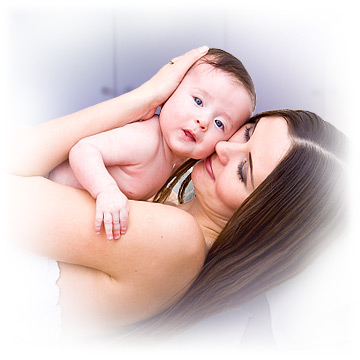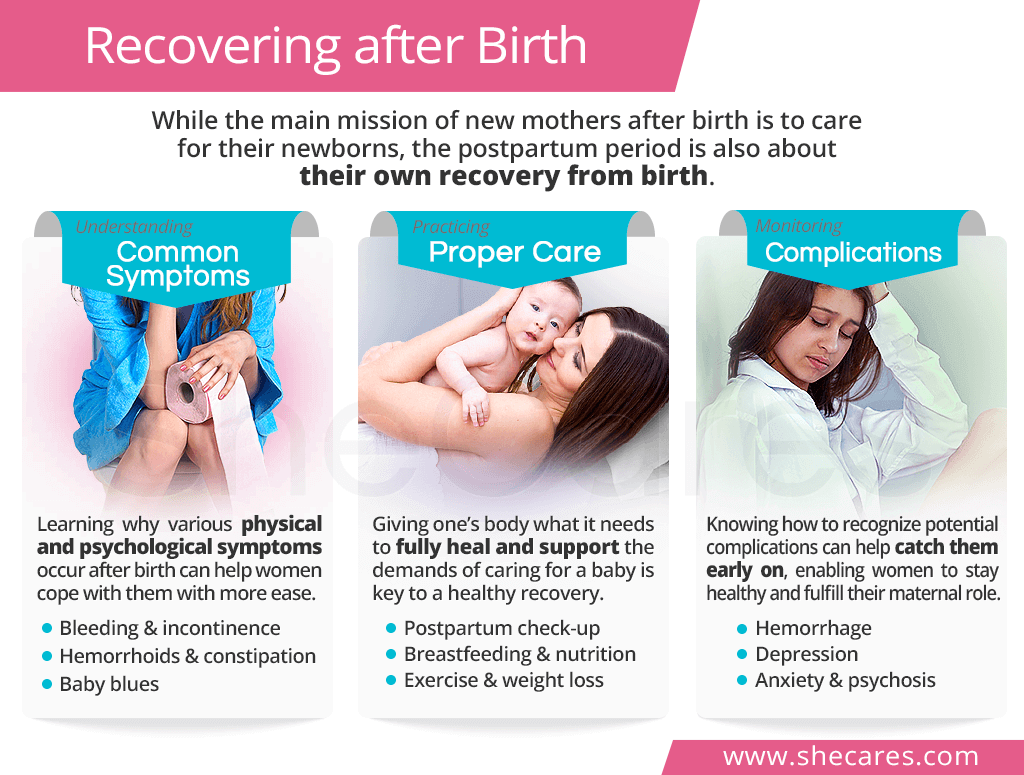Postpartum Symptoms

During postpartum recovery, women can anticipate numerous physical and psychological symptoms. While some might be more bothersome than others, all postpartum symptoms are mild and should not cause much distress.
Postpartum Bleeding
The uterine lining that helped support the growing baby in the last nine months will now be gradually shedding. As such, starting from the first heavy and brightly red vaginal discharge called lochia, a woman will experience postpartum bleeding for the next four to six weeks, which will continue becoming lighter and less red.2
Postpartum Hemorrhoids
Some women suffer from hemorrhoids during pregnancy, while others get them after birth. In most cases, they are the result of the extra pressure put on the perineum, the tissue between the anus and the vagina. A natural increase of progesterone in the body also plays a part in postpartum hemorrhoids.
Postpartum Constipation
Postpartum constipation is common in women recovering from birth. It can be caused by medications used during the delivery that can slow down the digestive system. Most often, however, women struggle with bowel movements due to hemorrhoids and a painful perineum, which triggers them to retain stool, leading to constipation.
Postpartum Blues
As expected with such a major life event, up to 80% of women often experience postpartum baby blues for a few days after birth.3 Hormonal changes that ensue also contribute to feelings of weepiness, sadness, or anxiousness. However, baby blues are mild and last for only a few days, contrary to postpartum depression, which is discussed below.
Postpartum Incontinence
Some women might experience loss of urinary and bowel control after having a baby. Although understandably disturbing, postpartum incontinence is quite common as it is brought upon by stretching of the muscles during labor and delivery. Fortunately, it usually resolves within a few weeks without the need of further intervention.
First Postpartum Period
How soon a woman gets her first postpartum period is very individual and might take from six weeks to three months, greatly depending on whether she is breastfeeding.4 Exclusively breastfeeding mothers might not have their menstrual cycles restored for longer. In all cases, it is normal for post-pregnancy periods to be irregular and anovulatory.
Read more to familiarize yourself in-depth with postpartum symptoms or continue to the next section to discover the most important aspects of postpartum care.
Postpartum Care

While vaginal healing after birth is usually quicker than Cesarean section recovery, mothers generally need at least six extra weeks to get back on their feet and resume their routines.
Ideally, women had a chance to discuss their postpartum care plans with their OBGYN before giving birth so that they have guidance on what to expect during their recovery after birth and ways to stay healthy.5
Postpartum Check-Up
Recent guidelines on postpartum care state that women should receive ongoing care, instead of a single postpartum check-up. Ideally, a new mother should seek contact with her doctor three weeks after birth and undergo a post-pregnancy examination no later than 12 weeks after the delivery.6
Breastfeeding
Although breastfeeding has been scientifically proven to provide a number of health benefits for the baby and the mother alike, it is undoubtedly a commitment. Nevertheless, there are numerous resources online and locally, where mothers new to nursing can find support and solutions to common breastfeeding challenges.
Postpartum Nutrition
An adequate postpartum diet can ensure that women give their babies the nutrients they need for development as well as to fuel their own bodies for a quicker recovery after childbirth. Though the exact calorie intake depends on many factors, like maternal body mass index (BMI), breastfeeding women generally need an extra 450-500 kcal per day.7
Postpartum Weight Loss
While it is common for women to struggle with body image after birth, it is important to approach postpartum weight loss with patience. Making a long-term plan for the next six to twelve months by combining a nutritious diet with adequate physical activity is optimal for reaching one's healthy weight in a safe way.
Postpartum Exercise
Once a woman is cleared to exercise after birth, she can start with walking or muscle-strengthening workouts for a few minutes a day and gradually build up to ensure 150 minutes of moderate-intensity aerobic activity per week.8 Because everyone's childbirth recovery and body is different, taking one's time is key to reaping benefits while staying safe.
Sex after Birth
Whether a woman had vaginal birth or a C-section, she will likely be advised to wait four to six weeks after birth before she resumes her intimacy.9 Many new mothers report significant changes in how sex after birth feels, like vaginal dryness and pain. Yet, these discomforts usually lessen with time as the body heals, and hormonal balance is restored.
Read more to familiarize yourself with the postpartum care you should be receiving or continue to the next section to learn about complications after birth to watch out for.
Postpartum Complications

Although caring for a newborn occupies the majority of a mother's time and attention, it is key to keep a watchful eye on potential complications that can have detrimental effects on her life and her ability to fulfill her maternal role.
Postpartum Hemorrhage
Hemorrhage after birth, defined as significant blood loss after childbirth, is one of the leading causes of maternal death around the world.10 Its primary type occurs within the first 24 hours after delivery, while secondary hemorrhage can occur between 24 hours and 12 weeks postpartum.
Postpartum Depression
Postpartum depression affects 1 in 9 mothers after birth.11 Although common, it is a serious mental illness that requires prompt treatment as it is not a normal part of postpartum recovery. Depressed mothers might not be able to fulfill their babies' needs and care for themselves, which can further worsen their mental state.
Postpartum Anxiety
Because the post-pregnancy period is known to be stressful, and unease among mothers is somewhat expected, postpartum anxiety is often misdiagnosed or considered a normal part of motherhood. However, untreated severe anxiety disorder after childbirth can negatively affect a woman's health and the care she is able to give to her newborn.
Postpartum Psychosis
Postpartum psychosis is a rare complication after giving birth as it affects 4 in 1,000 mothers.12 Because of the risk of hurting oneself or the baby, psychosis is a medical emergency that often requires hospital admission for proper treatment. With prompt diagnosis, most women reach full recovery.
Conclusions
Just like each new pregnancy differs from the one before, every postpartum period will bring its own set of experiences and challenges. While it is common for mothers to feel pressured to recover and restore their activities quickly after birth, studies have shown that inadequate postpartum care can have detrimental effects on women's health and their ability to care to their infants, which directly affects babies' development and future well-being. As such, women going through postpartum recovery should be surrounded by reliable support and given a healthy and safe environment so they can get back on their feet while doing what they do best: nurturing and protecting their newborn babies.
Sources
- Better Health Channel. (n.d.). First weeks after birth. Retrieved October 1, 2019 from https://www.betterhealth.vic.gov.au/health/ServicesAndSupport/first-weeks-after-birth
- March of Dimes. (2018). Your Postpartum Checkups. Retrieved October 1, 2019 from https://www.marchofdimes.org/pregnancy/your-postpartum-checkups.aspx
- Mayo Clinic. (2018). C-section recovery: What to expect. Retrieved October 1, 2019 from https://www.mayoclinic.org/healthy-lifestyle/labor-and-delivery/in-depth/c-section-recovery/art-20047310
- Medline Plus. (2019). Breastfeeding. Retrieved October 1, 2019 from https://medlineplus.gov/breastfeeding.html
- NHS. (2018). Vagina changes after childbirth. Retrieved October 1, 2019 from https://www.nhs.uk/live-well/sexual-health/vagina-changes-after-childbirth/
- University of Michigan. (2018). Postpartum: First 6 Weeks After Childbirth. Retrieved October 1, 2019 from https://www.uofmhealth.org/health-library/abl1277
Footnotes:
- Cleveland Clinic. (2018). Pregnancy: Physical Changes After Delivery. Retrieved October 1, 2019 from https://my.clevelandclinic.org/health/articles/9682-pregnancy-physical-changes-after-delivery
- Journal of Prenatal Medicine. (2010). Postpartum period: three distinct but continuous phases. Retrieved October 1, 2019 from https://www.ncbi.nlm.nih.gov/pmc/articles/PMC3279173/
- University of Rochester Medical Center. (n.d.). Common Conditions. Retrieved October 1, 2019 from https://www.urmc.rochester.edu/ob-gyn/obstetrics/after-delivery/common-conditions.aspx
- Better Health Channel. (n.dd.). Contraception after giving birth. Retrieved October 1, 2019 from https://www.betterhealth.vic.gov.au/health/HealthyLiving/Contraception-after-childbirth
- Better Health Channel. (n.d.). Caesarean section. Retrieved October 1, 2019 from https://www.betterhealth.vic.gov.au/health/healthyliving/caesarean-section
- American College of Obstetricians and Gynecologists. (2018). Optimizing Postpartum Care. Retrieved October 1, 2019 from https://www.acog.org/Clinical-Guidance-and-Publications/Committee-Opinions/Committee-on-Obstetric-Practice/Optimizing-Postpartum-Care
- CDC. (2019). Maternal Diet. Retrieved October 1, 2019 from https://www.cdc.gov/breastfeeding/breastfeeding-special-circumstances/diet-and-micronutrients/maternal-diet.html
- American College of Obstetricians and Gynecologists. (2019). Exercise After Pregnancy. Retrieved October 1, 2019 from https://www.acog.org/Patients/FAQs/Exercise-After-Pregnancy
- Mayo Clinic. (2018). Sex after pregnancy: Set your own timeline. Retrieved October 1, 2019 from https://www.mayoclinic.org/healthy-lifestyle/labor-and-delivery/in-depth/sex-after-pregnancy/art-20045669
- CDC. (2019). Pregnancy-related deaths. Retrieved October 1, 2019 from https://www.cdc.gov/vitalsigns/maternal-deaths/index.html
- CDC. (2019). Postpartum Among Women. Retrieved October 1, 2019 from https://www.cdc.gov/reproductivehealth/depression/index.htm
- Office on Women's Health. (2019). Postpartum depression. Retrieved October 1, 2019 from https://www.womenshealth.gov/mental-health/mental-health-conditions/postpartum-depression
